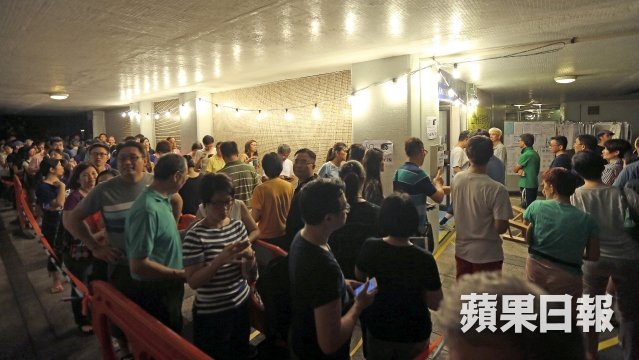Voters flew in from around the world, lined up until the early hours and turned out in record numbers to elect the city's parliament Sunday.
The poll for the Legislative Council is the first major election since hundreds of thousands took to the streets for the 2014 pro-democracy Umbrella Movement that shut down parts of the city -- a special administrative region of China.
"It shows that there is a major change in the mentality of Hong Kong people," says Chinese University of Hong Kong professor Willy Lam.
"People want to thumb their noses at Beijing and send a strong message that the past few years ... of suppressing Hong Kong's democratic aspirations cannot be tolerated."
In a statement carried by the official Xinhua News Agency, China's top body for Hong Kong affairs underscored Beijing's "resolute opposition" to Hong Kong independence and encouraged the local government to "mete out penalties according to law" for those who advocate it.
Hong Kong independence
Several prominent Umbrella Movement protesters were elected across Hong Kong, including Nathan Law, who co-founded Demosisto with activist Joshua Wong, who was unable to run as he is not yet 21.
Law, who at 23 will be Hong Kong's youngest ever lawmaker, described his win as a "miracle."
"This is absolutely unexpected -- nobody imagined this would happen," he said after results were announced.
Demosisto advocates for a referendum to be held on Hong Kong's future after 2047 -- when current constitutional arrangements run out -- and for that poll to include the option of independence from China.
"Hong Kong people want new hope and new vision in LegCo," Law told CNN.
"I think (Beijing) will be very worried, I'm representing a new vision of Hong Kong's future and a brand new force of the resistant camp," he added, vowing to continue civil disobedience action against Chinese Communist rule.
The debate over Hong Kong independence has defined the election, with several candidates barred from running for allegedly breaking electoral rules by advocating separation from China.
Edward Leung, one of those banned, urged his supporters to elect similarly minded "localist" politicians, and threw his weight behind them.
"They took one seat from us, we'll win three seats back," he told CNN ahead of Sunday's vote, a prediction that largely seems to have panned out, with Leung-endorsed Youngspiration candidates Sixtus Baggio Leung and Yau Wai-ching both winning seats.
Eddie Chu, a 38-year-old environmental activist, whose unexpected landslide election in New Territories West was the story of the night, told reporters Monday that Hong Kongers have chosen "democratic self-determination."
Independence from China, once unthinkable, should be an option in future, he said, according to the South China Morning Post, adding that he would work with similarly-minded lawmakers towards this direction.
Beijing to crackdown?
As many in Hong Kong celebrate, Lam warned that the reaction from Beijing may be dramatic.
"It's very likely that Beijing will use the unexpected success of localist candidates as a pretext for cracking down even harder on Hong Kong," he says.
He pointed to previous parallels drawn by Chinese officials between Hong Kong independence advocates and "separatists" in Tibet and Taiwan. Last month, China's top prosecutor posted an apocalyptic video online warning that the country could become like Syria or Iraq if such independence movements were successful.
"Whoever becomes (Hong Kong's leader) next year might be asked by Beijing to enact Article 23," Lam says, referring to a hugely controversial anti-subversion law that led to mass street protests in 2003 and the eventual resignation of then Hong Kong Chief Executive Tung Chee-hwa.
"Beijing must be quite alarmed at the success of (pro-independence) candidates."
Above and beyond
Despite early predictions that turnout would be lackluster, around 400,000 more people voted than in 2012. Lines stretched around the block in certain districts, as many complained online of understaffed polling stations.
More than 2.2 million people voted, according to the Electoral Affairs Commission, with a turnout of 58% -- up from 53% in 2012. Hong Kong does not permit postal voting or early voting.
"I knew I couldn't afford to miss it," first time voter Sophia Cheng, 25, told CNN.
In Tai Koo Shing, on Hong Kong Island, voters were still lining up as of 2 a.m. local time Monday.
Others went out of their way to ensure they would be able to take part. Post-graduate student Deryck Chan, 25, flew back from the UK to cast his vote -- a journey of 6,000 miles.
"I made sure to book my leave to coincide with the elections," he told CNN, adding that he did not go as much out of his way as some.
"There are people who literally flew to Hong Kong, landed, went to vote and then hopped on a plane back."
Others, like 28-year-old Jaco Tang, delayed trips overseas to ensure they'd be able to exercise their democratic rights.
"Every vote is important," Tang told CNN. "It's also important to convince your friends and family to support your choices, especially as many of them are swing votes even on (polling day), so it was important for me to stay in Hong Kong to convince them."
Cheng was eligible to vote in 2012, but was overseas. She said she felt "much more emotionally involved this time" after the 2014 protests known as the "Umbrella Movement."
Ella Wong, 27, was also studying abroad during the last elections. "I didn't care about politics that much then," she said, after casting her first vote on Sunday.
Another first time voter, 50-year-old Mandy So, says she felt indifferent in the past, but was taking part this year for the benefit of future generations.



No comments:
Post a Comment